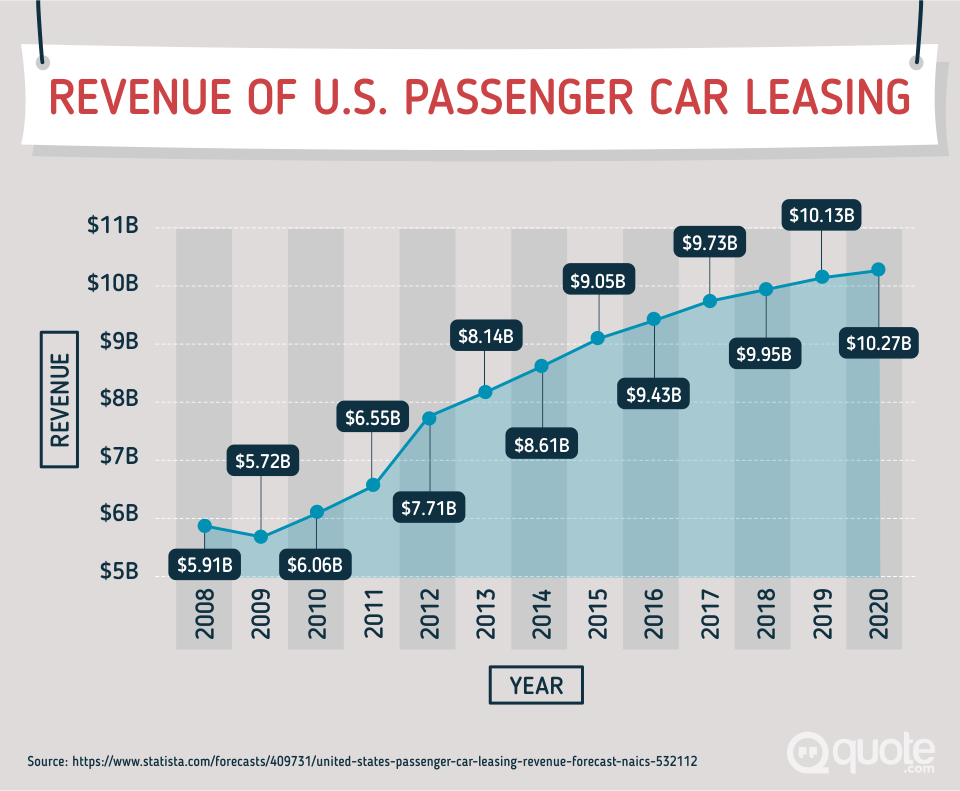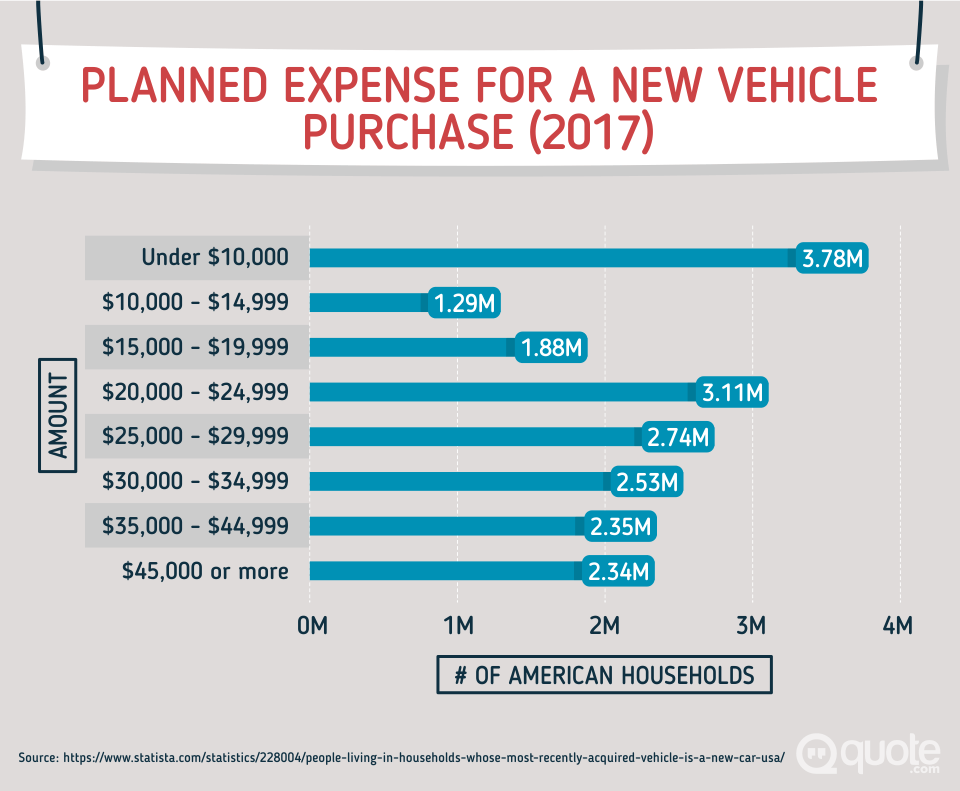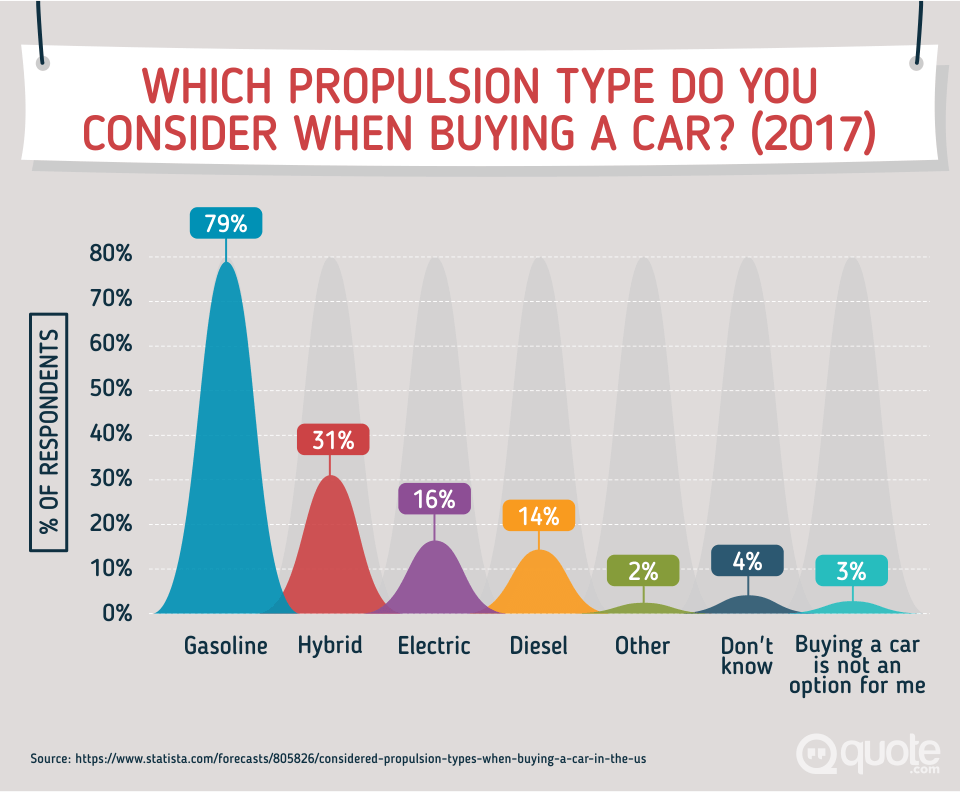The decision about whether you should lease or buy a car depends on a lot of things.
It's an important decision to take into consideration.
Financing your vehicle is something that will affect your budget for years to come.
We can look at statistics released by Experian Automotive to compare.
The average American auto payment is $493 per month on a new vehicle.
Those who lease get a bit of a break, but still pay an average of $412 per month.
It's hard for me to give you a single hard and fast rule on which is better, because it's different for everyone.
There are a whole bunch of financial factors you need to consider when deciding if leasing or buying makes more sense for you personally.
I've heard so-called "finance experts" argue for both sides.
More often than not, they seem convinced that only one answer can be correct.
Some say never to lease a car.
Others say never to buy a car.
So how do you know what the best choice is for you?
I've been driving cars for decades, and from my own experience, there were periods in my life when leasing a car made way more sense than buying.
But I've also experienced owning cars when I felt I was better off buying.
You probably fall somewhere in the middle where either one is a reasonable option.
Still, the "buy vs. lease" decision isn't one that you should take lightly.
Your decision could be worth thousands of dollars over the life of your vehicle.
So it's definitely worth taking the time to crunch the numbers.
If you're reading this because you can't afford to buy a car outright, then leasing might be your only option.
Thankfully, figuring out whether to buy or lease isn't overly complicated.
There are online calculators that can help you make the decision.
There are lots of other references you can take a look at too.
By the time you've finished reading this article, you'll know how to lease a car.
You'll also know whether buying makes more sense for your specific case.

Leasing
What is a car lease, why would I want one, and how does it work?
Before you can determine if you want to lease or buy your next vehicle, you might need a better understanding of what a lease is.
You can think of a lease like a long-term car rental.
Leasing a car is easy.
You might need to make a down payment on the vehicle at the beginning of your lease.
It's usually less than 20% of the value of the car.
This gives the car dealer a bit of security in case you're unable to pay.
Once you have your car, you make your pre-arranged monthly payment.
Your monthly payment usually stays the same over the whole life of your lease.
When the lease term is over, you just return the car to the dealership.
Leasing Pros and Cons
Here are some of the greatest things about car leases, and some negative aspects should you keep in mind as well
Pros: these are just some reasons why I think that leasing can be an excellent choice and make sense
If you don't have the cash to buy the car. Most importantly, leasing can be an option to get a car when you can't afford to buy one.
You simply make a monthly payment in exchange for using the car. You don't have to spend thousands of dollars up front.
You want to drive a vehicle outside of your purchase price range. Leasing can usually offer you "more car" for the same price.
For example, maybe you could only afford a Toyota if you were buying.
But you could lease a Mercedes for around the same amount each month.
You aren't likely to exceed the mileage cap in your lease contract. For most leases, this is around 10,000 and 15,000 miles per year.
The penalties for exceeding your mileage cap can start to add up quick.
It's usually a set number of cents per mile that you go over.
So if you have an exceptionally long commute to work every day, leasing might not be the best choice for you.
You'll take good care of your car. Maintaining your car's exterior and interior will help you avoid extra charges at the end of your term.
Pay particular attention to preventnicks, spills, and other cosmetic damage.
Leasing might not be the best choice if you have young children!
You plan to lease again. If you expect to lease another car when your vehicle's current contract expires, then it can be an excellent choice.
Are you someone who quickly gets bored of the car they're driving?
Leasing a vehicle is perfect for people who want the excitement of a new car every couple of years.
You need a lower monthly payment. You might not have a substantial down payment or have a high-value trade in (aka residual value on your current vehicle.)
In that case, leasing will almost always get you a lower monthly payment than you'd be able to get if you purchased the same car.
You might even be able to add in a few extra options while staying within your budget.
Tax deductions. If you use your car for business purposes, you can probably write off your lease payments as a tax deduction.
That means you can get a luxury vehicle to impress your clients but take advantage of the tax benefits as well.
No trade-in stress. You won't need to worry about trading in a car you own when you want a new one.
When the lease term ends, you just drop the car off at the dealership.
Cons: on the other hand, here are some good reasons to shy away from leasing
No equity. You don't own the car that you lease.
When your lease terms expire, you give the car back to the dealer.
Then they lease it out to someone else or sell it off as a used car.
You don't have equity built up in the car to trade in toward the purchase of a new vehicle.
Penalties. Lease terms can carry steep penalties.
The leasing company can hit you with penalties for a number of reasons:
- If you exceed the number of miles in your lease contract.
- If you want to return the car early before your contract expires.
- If you fail to keep the interior and exterior of your car in excellent condition.
- If you drive the car hard and inflict significant wear and tear on the car's appearance and performance.
Long-term expense. Over a longer timeframe, like ten years, the cost of leasing can be more than the cost of buying a new or used car.
Especially if you are leasing multiple different vehicles, it will add up in the long run.
Great credit is often required. There are a few exceptions.
But generally, you'll need to have a top-notch credit score to be able to lease a car.
You'll especially need excellent credit if you're trying to get manufacturer-subsidized special lease deals.
But it's not the end of the world for those with less-than-stellar credit.
Luckily, there are some programs out there for lease customers with bruised credit.
But it's usually easier to get a loan from banks or credit unions than a lease if you have poor credit.
GAP insurance. Some leasing companies may require you to pay GAP (guaranteed auto protection) insurance.
This covers the difference between your vehicle's actual cash value, and the balance still owed on the financing.
This can actually be a benefit to you though.
It's useful in the event of theft or a really bad accident where your entire car gets written off.
Your insurance company might not cover the full value of the car for whatever reason.
With GAP insurance you aren't stuck paying the difference back to the dealer out of your own pocket.
Payments forever. As long as you're leasing, you'll always have car payments.
There's no option to pay it off like when you buy a car.
Buying Pros and Cons
What are the situations where it makes sense to buy instead?
You can afford it. If you have the money to buy a car outright, it will be a lot cheaper.
You own it. When you buy a car for cash, you get full ownership as soon you sign the contract and hand over payment.
No restrictions. Since you own it, you don't have to answer to anyone.
You won't have to pay mileage restrictions or excess wear fees.
It's your property, so you can pamper it and keep it pristine, or you can enter it into a demolition derby if you really want to.
Poor credit. Your credit doesn't have to be quite as excellent to buy when compared to leasing.
There are still downsides to buying that you should keep in mind though
More expensive in the short term. If you're paying cash, you'll need a lump sum of money to make your payment all at once.
If you're financing your purchase through the dealership, you'll pay some interest on top of the base price too.
Down payment. You typically need to make a sizeable down payment to drive the car home, depending on your credit and the agreement with your dealer.
If you don't have any savings, this might take you some time to come up with.
Depreciation. A car you buy starts losing its value as soon as you drive it off the lot.

Depreciation can be unpredictable too.
There's no guarantee what your car will be worth in 5–10 years.
Making The Choice
Use online calculators and tools to find out whether leasing or buying is the right option for you
It's easy to find out whether buying or leasing is better for you in just a few minutes.
Using an online loan or lease calculator can help you make sense of the decision.
You'll need some basic information to use a finance calculator:
- Car make
- Car model
- Car year
- Trim options
- Vehicle Price
- Down payment amount
- Trade-in value
- Sales tax
- Interest rate (APR)
- Loan term
- Lease term
Once you enter this information, you'll get a pretty good estimate of how much you could expect to pay on a car loan or lease.
How to Lease
These are the actionable steps you should take if you decide that leasing is the right option for you
- Get acquainted with leasing. You need a basic idea of how leasing works before you consider it. Luckily, by the time you're done reading this article, you'll be well on your way!
- Budget. Decide how much you're willing your monthly payment amount to be.
- Choose a vehicle type. What kind of vehicle would you like to see yourself in? A convertible? An SUV? A pickup truck? A sedan?
-
Pick your model. Once you've set a budget, you can make a list of cars in your price range. Don't neglect to take other considerations into account.
Good gas mileage, lower insurance premiums, and other factors can reduce the overall costs of your car besides just the lease.
You might want to take other factors such as high dependability and safety features into account as well.
-
Book a test drive. After you've reduced your list to just a handful of models, get ready for some test drives. Take each car on your list for a spin.
Important things to pay attention to are the comfort, braking, steering, visibility, and shock absorption.
At this point, don't tell the car salesperson yet that you intend to lease.
-
Ask questions. Get the salesperson to explain all the vehicle features during your test drive. Does it have ABS (anti-lock brake systems), ESC (electronic stability control), side airbags, or other features?
-
Compare deals online. After your test drives, look at what lease offers are currently available. Calculate how much you'd be able to afford to pay monthly.
-
Go back to the dealership. Up to this point, we still haven't told the dealer that we plan to lease. That's because first, we want to negotiate a purchase price.
Most people don't realize that your monthly lease payments are computed based upon a final price that you must first agree upon.
-
Negotiate. You can sign up at consumerreports.org for $6.95 a month to find out what a new car costs a dealer. From there, you can negotiate up to a final price that both parties agree to.
Your price will end up somewhere between the wholesale price that the dealer pays and the MSRP (manufacturer's suggested retail price).
Your final price will determine what your monthly lease payments will be.
-
Sign the paperwork. You'll need one last visit to your showroom to make it official. You might get offered additional items.
These can be additional forms of insurance, prepaid maintenance plans, or other add-ons.
Some people might benefit from these, but make sure you're making the right decision.
Don't feel pressured to make a snap decision about extras. Walk away to take an extra day and think about it if you need to.
Remember, the salesperson is probably eager to make the sale, and you're the one in control of the situation.
When you go to sign, make sure to double-check that all the numbers and conditions on the contract match what you agreed to.
Particularly look out for extra charges or fees.
Once you sign your name, there's typically no going back.
-
Make your lease payments. Like any form of credit, you'll incur penalties if you don't pay your lease on time, not to mention getting a hit on your credit score.
You can lower your lease payments by making a larger initial down payment, if you're able to afford it.
You'll want to make sure that you can reliably make your lease payments for the life of the lease.
If you find it to be too much and need to turn in your leased vehicle early, you'll end up paying penalties as well.
Get Your Car
You should now have a solid understanding of the differences between buying and leasing a car
You should also have a solid idea of which one is right for you.
Deciding how you'll finance your next car is a big decision.
Either way, it will cost you thousands of dollars over the period that you have your vehicle.
It's worth taking some time to make the best decision.
It can be hard to figure out whether leasing or buying is the best option.
Some experts seem to think that the answer is cut and dry.
They say that either leasing or buying is right 100% of the time.
My own opinion is a bit less rigid.
Leasing is great if you can't afford to buy a car outright, for example.
But buying is cheaper if you can afford to buy the car outright, and helps avoid penalties and other restrictions.

I think either can be a great option, depending on your own circumstances.
Thankfully there are online calculators and guides that can help you work through the math.
Using these tools can help you make an informed choice about how to approach your future vehicle.
Once you've decided whether to lease or buy, you still have a bit of work to do.
There are a set of steps you can take to avoid getting overcharged by your dealer.
One of the most important parts of the process is finding out the wholesale price that the dealer pays for a car model.
Then you can negotiate a final price or monthly lease payment lower than the advertised price.
Make sure you take the car out for a test drive before you sign as well.
After all, you're going to be driving it for at least the next couple of years.
Pay particular attention to comfort.
Seating adjustments, headroom and legroom are all important if you'll be doing a lot of driving.
Crashworthiness rating and driver visibility, especially blind spots, are also vital things to consider.
Once you're sure, there's nothing left to do except make it final and enjoy your new car!
Did you lease or buy your current vehicle?
What were the main factors that you took into consideration?
Any tips for first-time car buyers or lessees?
Feel free to share them in the comments below!